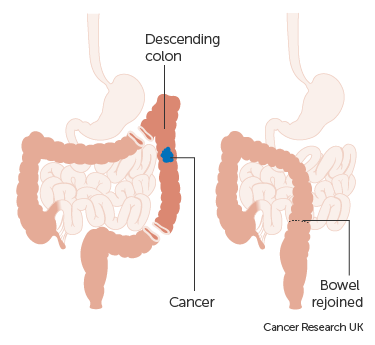Colectomy in Vietnam
Find the best clinics for Colectomy in Vietnam
No clinics available
Tunisia offers the best prices Worldwide
Price: $ 961

WHY US?
At Medijump, we're making medical easy. You can search, compare, discuss, and book your medical all in one place. We open the door to the best medical providers worldwide, saving you time and energy along the way, and it's all for FREE, no hidden fees, and no price markups guaranteed. So what are you waiting for?

Free

Best Price

Widest Selection

Risk-Free
What you need to know about Colectomy in Vietnam

Colectomy is a surgical procedure performed to remove part or all of the colon, also known as the large intestine. This procedure is usually undergone by patients suffering from health conditions such as colorectal cancer, diverticulitis, or inflammatory bowel disease. In Vietnam, top-notch healthcare facilities are available with experienced surgeons performing this procedure with precision and utmost concern for patients' safety and quick recovery.
Several types of colectomy procedures exist, including partial (where only part of the colon is removed), total (where the entire colon is removed), and proctocolectomy (where both the colon and rectum are removed). Your surgeon in Vietnam will apprise you of the type of colectomy that best suits your specific medical condition. While colectomy can remarkably increase the quality of life, as with any surgery, there are potential risks and complications.
What is the cost of Colectomy in Vietnam?
In Vietnam, the financial implications associated with the Colectomy procedure can vary significantly and are subject to several influential parameters. Key among these is the knowledge and experience of your operating surgeon, the complexities involved in your unique health condition, your overall physical well-being, the nature of the healthcare facility where this procedure takes place, and the resources expended during the surgery and recovery process. The choice between public and private health services can also produce a noticeable impact on the total cost.
Generally, there's an established cost range for this operation. However, one should bear in mind that in cases of unforeseen complications that necessitate further treatment or longer hospital stays, this cost might escalate. For comprehensive insights into potential financial commitments, it's recommended that one engages in discussions with healthcare professionals in Vietnam or gets in touch with their health insurance provider. This proactive conversation can offer a clear perspective on the financial commitments one can anticipate in relation to the surgery.
What does a Colectomy Procedure Involve?
A colectomy procedure in Vietnam typically entails either of two methods - a laparoscopic or an open surgery. The laparoscopic method, referred to as minimally invasive surgery, involves making small incisions in the abdomen through which specialized surgical tools are inserted. The open surgical procedure involves a larger incision to provide direct access to the colon.
To begin, the patient is usually placed under general anaesthesia. The surgeon will then make strategic incisions, remove the diseased parts of the colon, and reconnect the remaining parts to restore function. Depending on the extent of the disease, sometimes the entire colon may have to be removed. In such cases, the surgeon creates an artificial passage (stoma) for waste to leave the body.
How Long Should I Stay in Vietnam for a Colectomy Procedure?
The length of your stay in Vietnam post a colectomy procedure predominantly hinges on your unique recovery pace and the surgical method employed. As an example, for those undergoing a laparoscopic colectomy, hospitalization generally ranges between 3 to 5 days. For patients who've undergone an open colectomy, the hospital stay might extend up to a week, sometimes longer.
Keep in mind, that these timelines represent averages; individual recovery varies significantly. Hence, it is absolutely essential not to rush your healing process. Instead, give your body the necessary time to recuperate. Therefore, considering an additional few days in Vietnam beyond your hospital stay would be a wise course of action. This added time helps accommodate rest, and any needed follow-up visits, and makes certain that you are fit enough for your journey home.
A discussion with your own healthcare provider can provide a more accurate timeline, as they can offer a tailored plan based on your personal health condition and expected pace of recovery.
What's the Recovery Time for Colectomy Procedures in Vietnam?
Estimating the recovery time for colectomy procedures in Vietnam can vary significantly, reflecting each person's overall health, resilience, the type of surgery undertaken, and the uniqueness of each case. For those who've undergone a laparoscopic procedure, it usually takes about 2 to 3 weeks to return to their customary activities. Nevertheless, in cases involving open surgery, the recovery could extend to approximately 6 weeks or even more.
Following surgery, it's completely natural to feel some level of fatigue and weakness. Recovery is a gradual process, and it's crucial to afford your body the necessary time to recuperate appropriately. You should prioritize a balanced diet for optimal healing and slowly reintegrate your everyday activities.
What's the Success Rate of Colectomy Procedures in Vietnam?
Successful Colectomy procedures in Vietnam are notably high in number, owing largely to the proficient expertise and robust experience of the region's surgical specialists, complemented by leading-edge medical technologies. Nevertheless, a multitude of factors can influence the precise success rate, such as a patient's unique health condition, the kind and advancement stage of the disease, and any co-existing health disorders that may interfere with the recovery trajectory.
It's important to emphasize that while a colectomy can offer significant relief from symptoms and substantial improvement in life quality for people battling colon-associated ailments, all surgical treatments carry an intrinsic risk and potential complications. Hence, the notion of 'success' should be assessed holistically, combining the surgical outcome with the enhancement in the patient's life experience post-operation.
Are there Alternatives to Colectomy Procedures in Vietnam?
Yes, in Vietnam, there are alternatives to colectomy procedures that can be explored. The suitability of these options largely depends on the stage and severity of the bowel disease and the overall health of the patient. Certain non-surgical treatment methods such as medications or lifestyle changes may suffice in cases of mild to moderate bowel conditions. These approaches primarily focus on managing symptoms and, if possible, avoiding surgery.
Here are some of these alternatives:
• Certain medical conditions like Crohn's disease and ulcerative colitis may often be managed with different classes of drugs. These can range from anti-inflammatory medicines to immunosuppressants and antibiotics.
• Dietary modifications can also hold a significant influence on managing bowel conditions. This is particularly displayed in the handling of Irritable Bowel Syndrome (IBS), where foods triggering symptoms can be identified and avoided.
• Another lifestyle determinant is stress management. Techniques that help control stress levels can contribute positively to managing IBS and other related conditions.
However, it is crucial to note that when the disease is severe or advanced, surgical actions like a colectomy could be the most successful course to take. These options should be discussed thoroughly with your healthcare provider to make an informed decision and to opt for the treatment strategy best suited to your condition and lifestyle.
What Should You Expect Before and After the Procedure
Before you head into surgery, you'll get the rundown of how to best prepare yourself. This might include things like tweaking your diet or carrying out certain steps for bowel preparation. You might even need to make some temporary changes to your medication routine. And don't forget - it's wise to have arranged for some help during your recovery period post-surgery.
After you've had the surgery, expect to feel a little more tired than usual and potentially have a decreased appetite. Don’t panic - these changes are perfectly normal after a medical procedure like this. Remember, full recovery is not a sprint but a marathon. So taking it slow when getting back to your normal activities, taking good care of the surgical wound site, and keeping your meals balanced and nutritious will all help you on your way to full recovery. And, don't skip those regular check-ins with your healthcare provider - they're crucial to tracking your recovery, managing any potential concerns promptly, and guiding your post-op care. Remember, you're not on this journey alone - your healthcare team is walking this road with you.
What sort of Aftercare is Required for Colectomy Procedures in Vietnam?
After a colectomy procedure in Vietnam, careful aftercare is needed for optimal recovery. As part of your aftercare, your medical team will provide you with specific instructions tailored to speed up healing and mitigate possible complications. You'll likely need to adhere to a special diet to help your digestive system adjust. Foods that are easy to digest, like highly nutritious broths, will typically be suggested initially.
It's also vital to remain vigilant about your wound care to prevent infection. Your healthcare provider will typically discuss proper wound care techniques with you, which might include regular dressing changes and monitoring for any signs of infection. As part of your aftercare, you'll likely have scheduled follow-up appointments with your surgeon to monitor your progress. It is equally imperative that you maintain a balanced lifestyle: healthy diet, gentle exercise as approved by your doctor, and adequate rest. Following these guidelines is key for a smooth recuperation process.
How do I prepare for a Colectomy procedure in Vietnam?
When prepping for a colectomy operation in Vietnam, several important steps need to be undertaken. To begin with, expect to undergo a series of diagnostic screenings. These tests allow doctors to closely examine your colon's state and other key factors associated with the surgery.
Your physician may also provide you with specific preoperative medications to decrease the likelihood of any surgical complications.
Key to successful preparation is the bowel preparation process. This entails adhering to a particular diet and possibly the use of laxatives. The purpose is to ensure your colon is cleared out before surgery. It's strongly advised to refrain from the consumption of any solid foods a minimum of 12 hours ahead of the procedure. It's equally important to have a thorough discussion with your doctor about your current medication intake, as certain medicines might need to be discontinued temporarily.
Whilst the information presented here has been accurately sourced and verified by a medical professional for its accuracy, it is still advised to consult with your doctor before pursuing a medical treatment at one of the listed medical providers
No Time?
Tell us what you're looking for and we'll reachout to the top clinics all at once
Enquire Now

Popular Procedures in Vietnam
Prices Start From $514

Prices Start From $2,487

Recommended Medical Centers in Vietnam for procedures similar to Colectomy

- Interpreter services
- Translation service
- Religious facilities
- Medical records transfer
- Medical travel insurance
- Health insurance coordination
- TV in the room
- Safe in the room
- Phone in the room
- Private rooms for patients available

- Interpreter services
- Translation service
- Religious facilities
- Medical records transfer
- Medical travel insurance
- Health insurance coordination
- TV in the room
- Safe in the room
- Phone in the room
- Private rooms for patients available

- Interpreter services
- Translation service
- Religious facilities
- Medical records transfer
- Medical travel insurance
- Health insurance coordination
- TV in the room
- Safe in the room
- Phone in the room
- Private rooms for patients available

- Interpreter services
- Translation service
- Religious facilities
- Medical records transfer
- Medical travel insurance
- Health insurance coordination
- TV in the room
- Safe in the room
- Phone in the room
- Private rooms for patients available

- Interpreter services
- Translation service
- Religious facilities
- Medical records transfer
- Medical travel insurance
- Health insurance coordination
- TV in the room
- Safe in the room
- Phone in the room
- Private rooms for patients available
